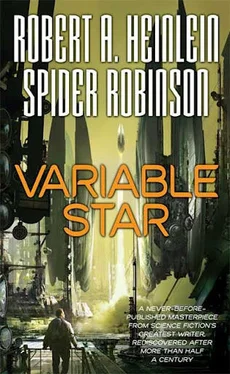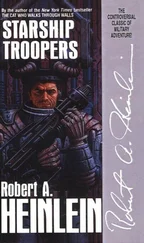Five minutes later it was broken—from inside the Chamber.
At first, all I could tell was that someone was yelling in there, very loud. But as they got him closer to the outer door, his tone and then his words became audible. I don’t think it took any of us on line more than half a second to understand. He was screaming at the top of his lungs, with berserker rage. At the stars.
“—shit-eating piss-drinking pig-fucking goat-sucking maggot-licking baby-raping well-poisoning illegitimate spawn of degenerate diseased vermin-vomit”—he was shrieking as they forced him out into the corridor—“I’ll pop your mutant eyeballs with your own—” and at that point Proctor DeMann came trotting past me, touched him gently near the base of the neck, and caught him as he fell. He stood there with the man in his arms, his breathing as slow and measured as if he’d been standing in line with me, and gestured with his chin.
“Next!” he said.
I nodded to him, stepped into the lightlock, waited for the outer door to iris shut, then opened the inner one and entered the Chamber, almost on the heels of the two people who’d ejected the screamer. I stopped and waited for my eyes to adjust, and for the self-appointed bouncers to resume their seats so I could tell which was the empty one. The experience of the room came on like a powerful drug rush.
There was nothing to the Star Chamber, in one sense. A spherical room that was cut into upper and lower hemispheres by a floor filled with sling couches—but seemed not to be because the floor and couch frames were transparent. That was basically it. Until it was powered up.
But then one of the Sheffield ’s countless servers caused the walls to display the universe.
Not perfectly, as I said. But well enough to fool the subconscious. And the heart.
Not the unrecognizable mess we would have seen out of portholes, if there had been such silly things—but a corrected image, which removed the eye-wrenching distortions and displacements of relativistic Doppler effect. The universe as it actually was out there right now, for anybody who was not racing photons. As we would see it if somehow it were magically possible to instantly shed all our hideous inertia and decelerate to sublight velocity for a few moments. Well, obviously not as it was right now; there had to be some lag, and some assumptions made. But close.
It was quiet and still in there, now that the sufferer had been removed. By the time my pupils had finished adjusting, I saw that the room had been reprogrammed as I had expected it would be. Known it would be.
When humans sit together to look at the stars, they look up. It’s way older than rational thought, possibly older than thought. So the Star Chamber was customarily programmed to place whatever part of the universe the Chamber’s inhabitants found most interesting directly overhead. Most of the time, though by no means always, that had meant Immega 714 could be found at galactic high noon.
Today, Peekaboo was directly under our feet, and we were all looking at where Sol had been.
As I had expected, someone had explained to the computer that it could delete Sol from its permanents, now. To have seen it there still blazing in the sky would have been unendurable. I had vaguely wondered if they would attempt some graphic representation of the explosion, but of course they had had better sense. To watch that happening forever in slow motion would have been equally unendurable.
What was there was endurable—but only just. Only just barely. It was shocking, and… neither “pitiful” nor “humbling” even come close to touching it, but those are the two closest words I can find. It didn’t matter in the slightest that I had fully expected it, that I understood it intellectually and had for all my adult life, that it was old news.
It was simply heartbreaking, mind-numbing, soul-chilling, to see, with my own eyes, what an incredibly tiny, insignificant hole the removal of Sol left in the fabric of the Galaxy.
If I had not known exactly where to look, and been thoroughly familiar with that particular degree of the sky, I’d have missed it. Anyone would have.
As I stared, mesmerized, it came to me for no reason at all that the very first cinematic work to take starflight seriously had been titled Star Wars . The irony was mind-melting.
I thought I felt a great disturbance in The Force—as if millions of voices had cried out as one, and then were silent.
Millions, you say? Hell, son, suck it up and walk it off! For a second there, I thought you had a problem .
Try forty-seven billion.
That was why I had come here, I realized. I’d had to see it with my own eyes. Among other things, I needed to put my brain more in synch with my mind.
My mind understood all about the universe and its correct scale and mankind’s terrible insignificance in it—intellectually. It always had. But my brain had always seen things differently. To it, the Solar System was practically everything there was, and tiny hypothetical little Brasil Novo was the rest, and in between the two lay nothing but a gap in the map—one wildly out of scale. Like a Mercator projection of a globe, it was a false representation of reality that was much more useful than the truth.
Until now.
For humanity, the whole universe right at this moment consisted of nineteen tiny colonies, at least two of them believed to be slowly dying, many of the rest doomed. All of them many many light-years distant from one another, communicating by laser or radio. Even if any of them should survive this, it would take us many decades, maybe centuries, merely to finish hearing what each of them would have to say about this shared catastrophe, when they found out, and as long again after that before we could possibly hope to hear a word of response from anyone to anything we might say.
To my personal brain, the whole universe now consisted of the Sheffield , and emptiness. Bravo was a fantasy.
To my mind, the whole universe consisted of Bravo. The Sheffield was now just an antechamber, with a timelock on the door.
But my eyes kept reminding me that neither was true. It was good to be reminded.
Because sitting in a chair spoils the illusion somewhat, the Star Chamber restores it and reinforces it by always drifting slightly, while keeping the focal star overhead. It works quite well. The universe as it actually is blazed all around me, and I floated in it, so convincingly I felt the first faint symptoms of psychosomatic dropsickness.
But it no longer held the beauty, the majesty, the grandeur, the glory that it had always held for me before.
For no reason I could name, my mind leaped back more than six years to the night of my prom. Jinny and I orbiting each other like halves of a binary star. Someone singing, “It would not be so lonely to die if I knew/I had died on the way to the stars—”
In my brain, I was no longer on my way to the stars. I was on my way from them, to refuge.
With more than twice the distance I had already covered still to go.
I felt and heard my own left foot start tapping spastically on the deck. I needed my hand to make it stop. For some reason that made me want to cry.
Someone ahead of me and to my left stood up and cleared his throat.
There was a rumble of annoyance, and a woman behind me muttered, “Whatever it is, keep it to yourself.”
But then he said, “I apologize for disturbing your wa, ” and there was general relaxation as his voice was recognized. Tenzin Hideo Itokawa was well liked, even by those few who had problems with Buddhism—possibly in part because in over six years I had not heard him use the word once. He was also one of the gentlest and kindest souls aboard, and what he did best of all was listen. You make remarkably few enemies that way. And finally, of course, everybody knew that he kept the most popular man aboard, his partner Solomon Short, extremely happy. And not just because Sol kept mentioning it.
Читать дальше










